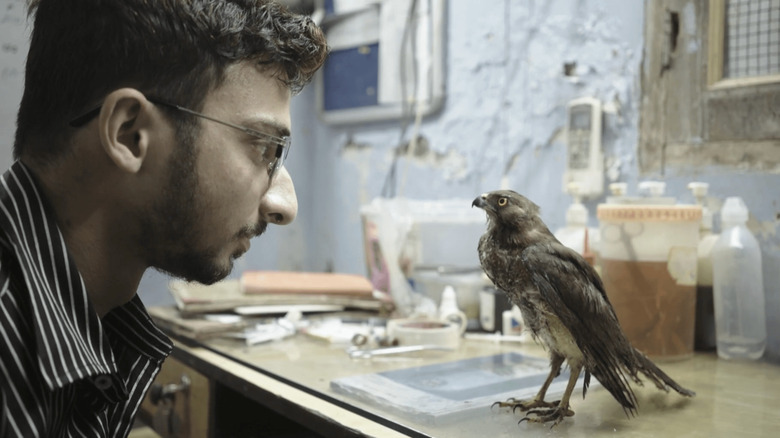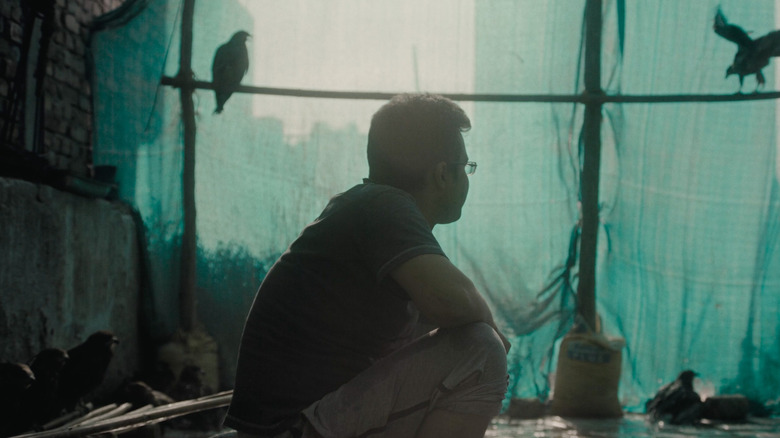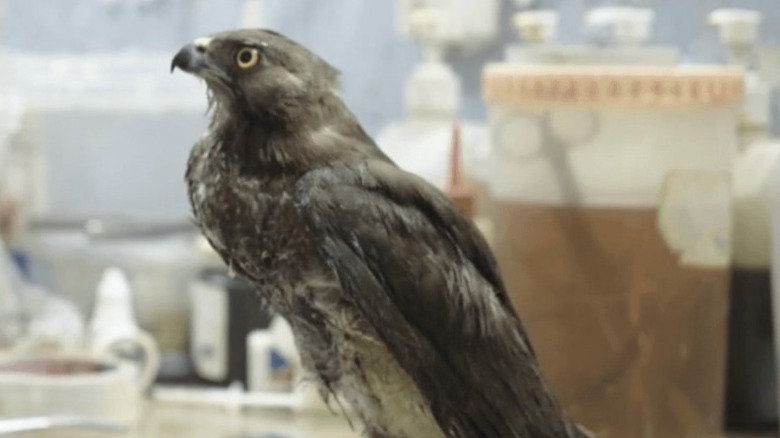All That Breathes Review: This Documentary Paints Sad Elegance For New Delhi Bird Surgeons [NYFF]
Birds are falling from the hazy skies of industrial New Delhi. Because no one else will, two working-class Muslim brothers, Mohammad Saud and Nadeem Shehzad, set out to care for the black kite birds in their garage. For them, their attachment to the birds started with their elders training them to feed the kites for religious credit. The background of the brothers' surgical skills with birds is a fascinating one, shared in a few words. The pair were once teen bodybuilders. They applied their knowledge of the "flesh, muscles and tendons" when operating on injured black kites, since they are often rejected from veterinary treatment due to their status as carnivorous raptors.
In "All That Breathes," New Delhi–based director Shaunak Sen imbues their ecological savior effort with a matter-of-factness far from chipper. It's no glamorous duty for the brothers to gather the injured birds and collect them into their makeshift hospital. One well-selected scene shows Saud and their social media manager and assistant, Salik Rehman, swimming across a river to collect a flightless black kite as they drag a cage floating on a life buoy. While it isn't played as urgent, we hear the swimmers' concerns and complaints that they could drown due to exhaustion. In another judicious peep, we witness some bargaining with a meat seller that reveals the difficulty of attaining provisions in their economy. The meat seller voices his utmost support for the brothers' cause but he cannot afford to lower the price of meat.
We're also privy to administrative arguments between the brothers, such as when a meat-churner needs fixing. Later, Saud explains that his quarrel with his Nadeem indicates something bigger than finance, ego, or petty emotions. "Delhi is a gaping wound. And we're a tiny Band-Aid on it," he said. He knows that the smoke and inaccessible resources are so systemic that he identifies them as a poison intensifying their professional stress.
A mood of smog
Starting with a crisp night panning shot of chittering rats scavenging in the trash, the mood of "All That Breathes" remains portentous. The thickness of the expansive smog shots in "All That Breathes" illustrates the environment graying faster than the brothers' human hands and resources healing the birds. The ecological relationship between the city-filled landscape and the black kites is fraying. Without hagiography or sunny optimism, the emphasis on decay serves to emphasize the systemic adversary. There is some hope, implied through a spoken observation. Early on, we learn that black kites trained themselves to collect cigarette litter to ward off parasites. If the raptors can evolve and adjust, then so can the brothers.
To add to the ecological apocalypse, there is an atmosphere of unrest in the news and streets of New Delhi. The brothers are up against the political volatility swirling around their lives: In 2019, a recently announced Citizenship Act will accept refugees, but on the conditions that said refugees do not adhere to Islam. One of their relatives mentions attending a protest against Islamophobia. The family discusses the jeopardy the laws could bring to their citizenship papers and right to be refugees should they have to leave India.
Sen utilizes sparing interviews, and never with a forced pretentious setup. The few interviews have their subjects at comfort with their respective environment. There's one key interview with Nadeem, shot casually in a playroom with a child at his knee, where he mentions he feels trapped. Though we understand their resilience and motives in the broad strokes, the shortcoming of Sen's approach is that we're mostly remote from the human faces. We get to know them as people but are too distant from them to familiarize with the human faces as individuals. Though one of the few effective glances arrives when Nadeem describes his intentions to go to school in America to improve his bird-rescuing skills. Their conversation is met with a pregnant pause, without a cut, as the two sit together snacking.
There's also one effective scene that works by maintaining distance yet allowing the sound to bridge the gap. Salik sits in the back of the moving van and receives a worried call from his mother. He watches a video on his phone. Neither camera nor a cutaway clarifies the violence encapsulated on the video screen, but we watch from the medium-shot distance as Salik gazes at his phone. We do discern audio of an unrest, suggested beatings, and screams. The impact speaks to Salik and the audience with disquieting normalcy when Salik re-pockets his cell phone, adjusts his glasses, and stares out the vehicle window.
Hope in the air
Although the brothers receive the funding to establish a new Wildlife Rescue clinic, it's a mundane milestone that plays like an overcome hurdle, yet far from celebratory. Their work continues. The documentary concludes with them discussing a new complication. They look out the window of their new clinic and fret about the logistics of transporting the birds through the city's cracking infrastructure to their caring hands. Saud remarks, "Look at the appalling condition of our street... With streets like these, it's going to be impossible for people to bring birds." Perhaps a great tragedy, as seen with the meat seller, is how compassion can barely externalize into action because the infrastructural and economic environment renders noble deeds less and less accessible with each passing day.
But even if the bird rescuers' efforts are merely a "Band-Aid" against an ever-engulfing miasma, Shaunak Sen provides a worthy arc for the audience to grasp an elegant understanding of the brothers' ecological purpose. Their compassion carries a dimensional weight that cannot be separated from their fight against India's national Islamophobia. The brothers bear a deep community and solidarity with the black kites because they, a marginalized community oppressed within their own home, are forced to be made small in this world. When that purpose is made explicit through an elegiac voiceover, the editing selections focus on the black kites, their heads, their eyes, their curved beaks with lucid and loving clarity. Each bird sent back to the sky means that there is still fight left in the brothers after all.
/Film Rating: 8 out of 10


